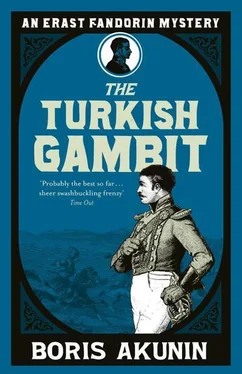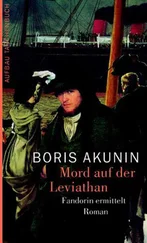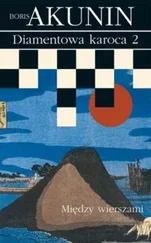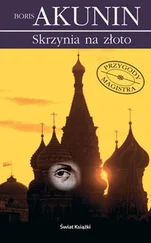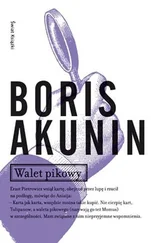'. . . I thought it was love,' Michel confessed in a soft voice, seeming to stare out into the darkness through the window; but Varya knew that he was looking at her reflection in the glass. 'But I won't try to lie to you. I never actually thought about love. My true passion is my ambition, and everything else comes second. That's just the way I am. But ambition is no sin if it is directed to an exalted goal. I believe in my star and my fate, Varvara Andreevna. My star shines brightly, and my fate is special. I feel it in my heart. When I was still a young cadet . . .'
'You were telling me about your wife,' said Varya, gently guiding him back to the more interesting subject.
'Ah, yes. I married out of ambition, I admit it. I made a mistake. Ambition may be a good reason to face a hail of bullets, but not to get married - not under any circumstances. How did it all happen? I came back from Turkestan to the first glimmerings of fame and glory, but I was still a parvenu, an upstart, a jumped-up peasant. My grandfather served his way up all the way from the lower ranks. And suddenly, there was Princess Titova, with a line going all the way back to Rurik. I could move straight from the garrison into high society. How could I not be tempted?'
Sobolev spoke jerkily, in a bitter voice, and he seemed sincere. Varya valued sincerity; and, of course, she had guessed where all this was leading. She could have put a stop to it in good time, turned the conversation in another direction, but she wasn't strong enough. Who would have been?
'But very soon I realised that high society was no place for the likes of me. The climate there doesn't suit my complexion. I was away on campaigns and she was back in St Petersburg. And that was our life. When the war's over, I'll demand a divorce. I can afford to, I've earned it. And no one will rebuke me - after all, I am a hero.' Sobolev grinned cunningly. 'So what do you say, Varya?'
'About what?' she asked with an innocent expression. It was her abominably flirtatious character leading her on again. She knew this declaration was not what she really wanted - it could only cause complications; but it still felt wonderful.
'Should I get divorced or not?'
'That's for you to decide.' This was the moment: now he would say those words.
Sobolev sighed heavily and plunged head first into the whirlpool.
‘I have been keeping an eye on you for a long time. You are intelligent, sincere, bold, strong-willed. Just the kind of companion I need. With you I would be even stronger. And you would never regret it, I swear . . . And so, Varvara Andreevna, you may consider this an official . . .'
'Your Excellency!' shouted Perepyolkin (Damn him, why can't he just disappear!). 'San Stefano! Shall we disembark?'
The operation went off without a single hitch. They disarmed the dumbfounded guards at the station (no more than a joke - six sleepy soldiers) and spread out through the little town in platoons.
Sobolev waited at the station while the sparse shooting continued in the streets. It was all over in half an hour. Their only casualty was one soldier wounded, and he had apparently been winged by mistake by their own men.
The general made a cursory inspection of the centre of the town with its gas street lamps. Further on there was a dark labyrinth of crooked little alleys - it made no sense to go poking his nose in there. For his residence and defensive stronghold (in the case of any unpleasantness) Sobolev chose the local branch of the Osman-Osman Bank. One company of men was stationed in the bank and immediately outside it, another was left at the station and a third was divided into teams to patrol the surrounding streets. The train immediately set off again to bring reinforcements.
They were unable to inform the commander-in-chief's headquarters by telegram that San Stefano had been taken, because the line was dead. Obviously the Turks' doing.
'The second battalion will be here by midday at the latest,' said Sobolev. 'Nothing very interesting is likely to happen in the meantime. We can admire the lights of Constantinople and pass the time in pleasant conversation.'
The temporary staff office was established on the second floor, in the director's office - firstly, because from the windows you really could see the lights of the Turkish capital twinkling in the distance,- and secondly, because there was a steel door in the office that led directly into the bank's strongroom. There were little sacks with wax seals lying in neat rows on the strongroom's cast-iron shelves. Paladin read the Arabic script and said that each bag contained a hundred thousand lire.
'And they say Turkey's bankrupt,' said Mitya in amazement. 'There are millions here!'
'That's why we're going to be based in this office,' Sobolev said firmly. 'To keep it all safe. I've been accused once of making off with the khan's treasury. Never again.'
The door to the strongroom was left half-open, and everyone forgot about the millions of lire. They brought a telegraph apparatus from the station to the waiting room and ran a wire straight out across the square. Every fifteen minutes Varya tried to contact at least Adrianople, but the apparatus gave no signs of life.
A deputation arrived from the local merchants and clergy to ask them not to loot homes or destroy mosques but specify the sum of a contribution instead, perhaps fifty thousand - the poor citizens of San Stefano would not be able to raise any more than that. However, when the head of the delegation, a fat, hooknosed Turk in a tail coat and fez, realised that he was facing the legendary Ak-pasha himself, the sum of the proposed contribution immediately doubled.
Sobolev assured the natives that he was not empowered to levy any contribution. The hook-nosed gentleman shot a sideways glance at the half-open door of the strongroom and rolled his eyes respectfully.
'I understand, effendi. For such a great man a hundred thousand is a mere trifle.'
News travelled quickly in these parts. No more than two hours after San Stefano's petitioners had left, a deputation of Greek traders arrived to see Ak-pasha from Constantinople itself. They did not offer any contributions, but they had brought sweets and wine 'for the brave Christian warriors'. They said that there were many Orthodox Christians in the city, asked the Russians not to fire their cannons, and if they really had to fire, then not at the Pera quarter, where there were shops and warehouses full of goods, but at the Galata quarter, or - even better - the Armenian and European quarters. When they tried to present Sobolev with a golden sword set with precious stones, they were shown out and apparently left feeling reassured.
'Constantinople!' said Sobolev, his voice trembling with feeling as he gazed out through the window at the glittering lights of the great city. 'The eternal, unattainable dream of the Russian tsars. The very roots of our faith and civilisation are here. This is the key to the whole of the Mediterranean. So close! Just reach out and grasp it. Are we really going to go away empty-handed again?'
'Impossible, Your Excellency!' Gridnev exclaimed. 'His Majesty will never allow it!'
'Ah, Mitya. You can be sure that the big brains in the rear, the Korchakovs and the Gnatievs, are already horse-trading and fawning to the English. They won't have the courage to take what belongs to Russia by ancient right. In 'twenty-nine Dibich stopped at Adrianople, and now we've got as far as San Stefano. So near and yet so far. I see a great and powerful Russia uniting the Slavs from Arkhangelsk to Constantinople and from Trieste to Vladivostok! Only then will the Romanovs fulfil their historical destiny and finally be able to leave these eternal wars behind them and devote themselves to the improvement of their own long-suffering dominion. But if we pull back, then our sons and grandsons will once again spill their own blood and the blood of others along the road to the walls of Constantinople. Such is the cross the Russian people must bear!'
Читать дальше
